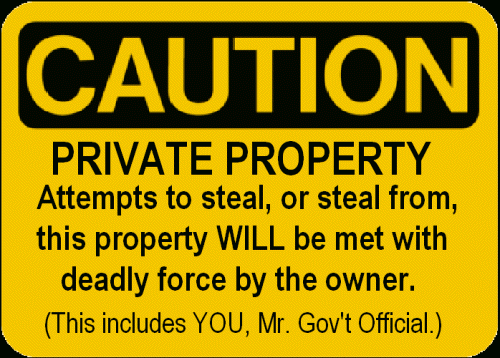לֹא תַסִּיג גְּבוּל רֵעֲךָ, אֲשֶׁר גָּבְלוּ רִאשֹׁנִים--בְּנַחֲלָתְךָ, אֲשֶׁר תִּנְחַל, בָּאָרֶץ, אֲשֶׁר יְהוָה אֱלֹהֶיךָ נֹתֵן לְךָ לְרִשְׁתָּהּ.Thou shalt not remove thy neighbour's landmark, which they of old time have set, in thine inheritance which thou shalt inherit, in the land that the LORD thy God giveth thee to possess it. (Devarim 19:14)
Rashi comments,
Rashi's comments, based on Chazal, only compound the questions: If stealing is prohibited, then why does the Torah add a special prohibition for encroaching on boundaries of property? How is property different than other possessions? And, if property truly is different, then why does this halachah apply only in the Land of Israel? Shouldn't moving property lines be equally bad no matter where one does it, whether in the Land of outside it?לשון נסוגו אחור (ישעיה מב יז), שמחזיר סימן חלוקת הקרקע לאחור לתוך שדה חברו למען הרחיב את שלו. והלא כבר נאמר (ויקרא יט, יג) לא תגזול. מה תלמוד לומר לא תסיג? למד על העוקר תחום חברו שעובר בשני לאוין. יכול אף בחוצה לארץ? תלמוד לומר: בנחלתך אשר תנחל וגו', בארץ ישראל עובר בשני לאוין, בחוצה לארץ אינו עובר אלא משום לא תגזול:The language of תשיג is from the language, "they shall be turned back," that one pushes back the markings of the division of the Land into the field of his friend in order to expand his own. Yet, does it not already state, "Do not steal?" What is the reason for the [prohibition] of "do not move back [the boundaries]?" This teaches you that one who uproots the boundary with his friend violates two prohibitions. I might think this applies even outside the Land? For this reason the verse teaches, "in the inheritance which you shall inherit." In the Land of Israel one violates two prohibitions, [but] outside the Land one [who changes boundaries] only violates [the prohibition of] "you shall not steal."
The answer to both these questions lies in appreciating the nature of the division of the Land of Israel. The Torah goes to great lengths to describe in detail the divine division of the Holy Land. In Bamidbar we read about the divine, miraculous nature of the distribution of the Land, telling us that the Land was divided as follows:
אַךְ-בְּגוֹרָל, יֵחָלֵק אֶת-הָאָרֶץ: לִשְׁמוֹת מַטּוֹת-אֲבֹתָם, יִנְחָלוּ. עַל-פִּי, הַגּוֹרָל, תֵּחָלֵק, נַחֲלָתוֹ--בֵּין רַב, לִמְעָטNotwithstanding the land shall be divided by lot; according to the names of the tribes of their fathers they shall inherit. According to the lot shall their inheritance be divided between the more and the fewer.'(Bamidbar 26:55-56)
There, Rashi (on 26:54) explains that this wasn't just any old lottery. Rather, the words על פי הגורל teach that the lottery itself spoke, and announced the winner of every piece of land. (Think of the Sorting Hat in Harry Potter.) God wanted everyone to know that He had decided who should receive each piece of land, and how much they should receive.
This, I think, explains the special prohibition of hasagat gevul which applies only in the Land of Israel. While we're always supposed to believe that God gives us as much as we require and not more, the division of the Land left nothing to doubt. God Himself gave you your piece of Land. It was not a matter left to question.
For this reason, should a person go ahead and move the border of his property into his neighbors' land, he clearly declares his dissatisfaction with the portion he received from God. It's as if he says, "Sorry God, I think You made an error. You didn't give me enough." That's not just theft. That's a direct affront to one's relationship with God.


No comments:
Post a Comment
Comments transform a blog into a community. Please join.